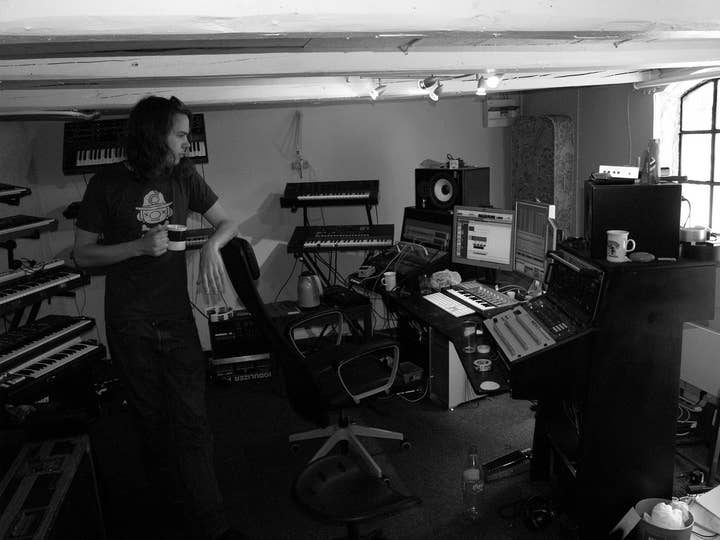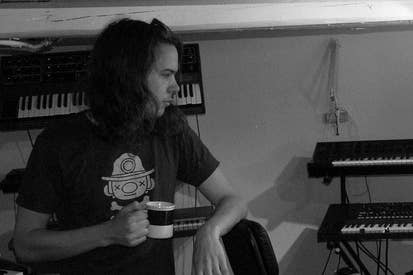Talking Shop: Freelance Composer
We delve into the freelance composition career of Eirik Suhrke
Those of you currently enjoying Vlambeer's Ridiculous Fishing on iOS have probably bounced to the chiptune beats of Eirik Suhrke. The freelance composer has been involved in a number of hot indie games, including Spelunky, Super Crate Box, and Hotline Miami. Eirik agreed to talk with GamesIndustry International on his entry into the game developmnet community and his work on indie titles. Interested in learning more about Eirik? Head over to his personal website, Strotch.
So for our audience here, tell us a bit about yourself: What do you do and what games have you worked on in the past?
I do a lot of things, but mostly I work on video games, and I mainly work on music/sound design. Most noteworthy so far is my contribution to Mossmouth's Spelunky on music and sound design. I've also worked with Vlambeer on games like Super Crate Box and the recently released Ridiculous Fishing, as well as some Cactus games, including a track for Hotline Miami.
Did you go through any formal training?
Writing music is a skill I've picked up on my own. I've been doing that for as long as I can remember. I am, however, educated as a sound engineer. I definitely use the skills I picked up at sound school when I record and mix music, as well as for the sound design part of my job.
How did you become attached to your first game project?
I started writing music for games as a hobby way before it became a job. The first projects I worked on were hopelessly ambitious and instantly doomed to fail RPG Maker games, which I wrote stuff for in my early teens. I believe the first released game I worked on was Mr. Blocko by Perfect Run, a Tetris/platformer hybrid. All these projects were just things I stumbled upon on forums and tossed myself upon.
"Tying myself to one studio would enforce some limitations to my creativity, I feel."
You call yourself a composer and sound designer, what's the difference between the two?
As a composer I write music, as a sound designer I create sound effects and tweak audio engines. In the games I've worked on so far the two have been easily discernable, but they don't have to be. I'm first and foremost a composer, but I enjoy the sound design work, too.
You're currently freelance instead of being attached to a single studio. Is that by choice?
It is by choice. I enjoy working with different teams. I tend to work with so called "indie developers", and I would say the spirit of the scene is not to bundle up into large groups but have everyone float around freely. Tying myself to one studio would enforce some limitations to my creativity, I feel. I would like to try it at some point though, for sure.
What software, equipment, and services do you use? Does it vary by title, or do you have a consistent workspace from game to game?
I use a handful of different things. What I use really depends on what the client wants / what I think will work best. At the chiptune end of things I use trackers such as Famitracker (NES) and LSDJ (Game Boy) to create those bleeps and blops. For something more akin to SNES or Amiga for instance, I like to use MODPlug tracker / Impulse tracker. For "full production" stuff, I use Pro Tools, along with a bunch of hardware synthesizers and other instruments. I use a lot of Yamaha FM synthesizers, which people tend to either love or hate.

How do you approach writing music for a game?
Usually I get a game description along with a screenshot or two. I start hearing music by default just from reading the description. Looking at the graphics very much dictates the instrumentation I will use - or the fidelity of the sound, if you will. I often compare the graphics with those of some video game console to a certain level, and set my basis of sounds based on that console's sound chip. At that point, I just sit down by a keyboard and start figuring things out, then program it into whichever program I've selected.
At what point in projects are you usually brought on board? Is the game mostly done, or are you brought in during the design stages?
I'm usually brought on board pretty early in the process. I've learnt to not do too much too early, though. Stuff keeps getting changed, and most projects become vaporware eventually. Usually I do a sound test or two in the early stages to give the team something to go off, and some inspiration, and then I come in again near the end and write the full score.
What's your daily routine like during game development? How many hours are you on the clock?
I work very sporadically. I can go days without producing anything work related. The flipside of that is once I get going I enter a trance and forget about necessities such as eating dinner or whatever, and write for hour after hour.
Are your works generally done in a single pass with developer input, or do you write a large number of songs for each game level/situation and let the developers choose their favorites?

I'm usually given a lot of freedom to write the music as I feel it would be best. Some teams, like Vlambeer, I write so much for that I have a sense of what they like, and they trust in me to write something cool. I don't need a lot of input from them, although we keep each other in the loop. Others have a harder time explaining what they want, and might take several passes. I always end up with a few outtakes by the end of a soundtrack, but nothing too crazy.
What happens to compositions that don't work out? Are they saved for other work?
I like putting them as bonus tracks on my soundtrack releases. Especially if we're talking about tracks that I like, but the developer didn't care for. Some ideas will be put in the bank and used for later projects.
As freelance, what occupies you between projects?
I work on some non-game-related music, such as stuff for my band Pajjama. I also design and program my own little games and programs, and work on visual art. I like doing a lot of different art, not just music, especially since I can listen to other music whilst working on it! Oh, and I just do nothing a lot of the time. Read books, watch movies/YouTube, take walks - the usual. Those things are an important catalyst for me, though. It's while not trying to work that ideas come to me with the most ease.
How you do find new projects to work on?
It's a really slow process of working with some people, have them come back for more, and also have other people enjoy your output and add them to the list. If I weren't doing this for the love of doing it, it wouldn't have worked out.
What advice would you give to those just beginning to look at freelance composition work?
Find some people you like working with, where everyone challenges each other and you all outdo yourself over and over again. Put yourself out there and get involved with as much cool stuff as you can.









